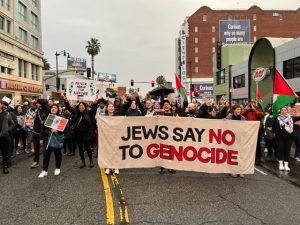I remember the first time I celebrated Canadian Thanksgiving. I was 19 years old and attended a dinner hosted by the Harvard Canadian Club in Cambridge, Mass. I suppose it was on a Monday in October, what my American classmates probably called Columbus Day before that term became politically incorrect. The turkey was dry, but the stuffing was good. Since I was born and raised in Montreal, some club members asked why I didn’t celebrate Canadian Thanksgiving growing up. I explained: “I’m Jewish. Canadian Jews don’t celebrate Canadian Thanksgiving.”
I confirmed this recently, when I celebrated Canadian Thanksgiving for the second time. It was in Richmond, Va., with Canadian expats and their American spouses. One of the hosts came from a mixed-faith family and grew up celebrating Canadian Thanksgiving. None of the others had. By contrast, American Jews celebrate Thanksgiving every November. In the United States, just about everyone celebrates Thanksgiving (except, perhaps, some of those people who object to Columbus Day). But most Jews proudly participate in this patriotic American tradition.
What does this difference tell us? To me, it suggests that Canada has a diffuse culture, more so than that of the United States. This enables Canadian Jews to more easily retain and express their Jewish identities, while fostering robust Jewish communities. Religious minority groups in Canada are more attached to their heritage than their American counterparts, and Canadian Jews fit this pattern by every measure – from synagogue attendance, to ritual observance, to visiting Israel.
This is not simply because most Canadian Jews are a generation closer to immigration, or because the Reform movement never succeeded in Canada as it has in the United States. It is related to the oft-heard distinction between the American melting pot and the Canadian ethnic mosaic, emblemized by former prime minister Pierre Trudeau’s 1971 declaration that “multiculturalism” would be official Canadian policy. As his son, Prime Minister Justin Trudeau, recently opined: “There is no core identity, no mainstream in Canada”; as a result, Canada is “the first post-national state.”
Given the recent result of the Quebec provincial election, it appears that nationalism is alive and well in Canada. Yet Trudeau’s description of post-nationalism still resonates with those who reject the bigotry of the far right. Indeed, those who oppose former prime minister Stephen Harper’s celebration of “old-stock” Canadians and Quebec premier-designate François Legault’s Islamophobia disguised as secularism, are fighting for a Canadian culture that is more tolerant and less overbearing.
READ: WEINFELD: THE GREAT EXODUS FROM EARTH
There are lots of things I like about Canada, like universal health care, gun control and legalized marijuana. But what I’ve always liked, more than anything, is that being Canadian allowed me to be me. As a result, my identity has always been mostly matzah ball, with a dash of maple syrup. I have more in common with a Jew from New Jersey than I do a non-Jewish Canadian from Montreal or Toronto.
To be sure, Canada has strong regional cultures, from the ancient heritage of the First Nations, to the particular traditions of the Maritimes and Prairies, to the distinct society of the Quebecois. But where most Jews live in Canada, the culture is multiculturalism. Insofar as there is an anglophone culture in Toronto and English Montreal, it is a hybrid version of American culture, with a hint of British. In Canada, I felt Jewish. Perhaps unsurprisingly, I had to move to the American South to truly feel Canadian.
I suppose I felt Canadian at the Canadian Thanksgiving dinner I recently attended. The meal was lovely and it was great to spend time with friends. I used to proclaim with pride that I was a Canadian who never celebrated Canadian Thanksgiving, because being Canadian meant not feeling any pressure to do so. But living in U.S. President Donald Trump’s America, I feel more Canadian than ever, and more Jewish. My Canadian upbringing, along with my Judaism, has provided me with the values to help resist Trump. I’m very thankful for that.






